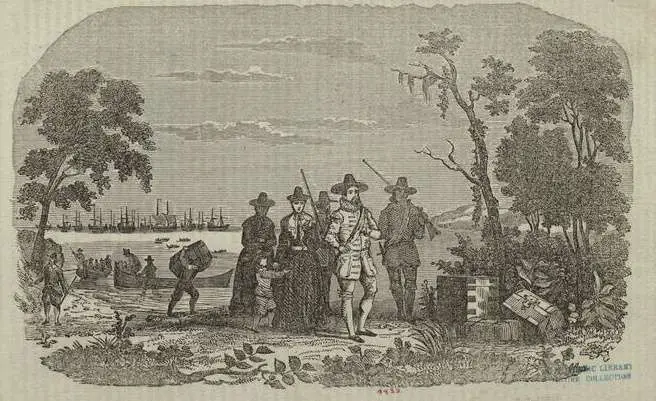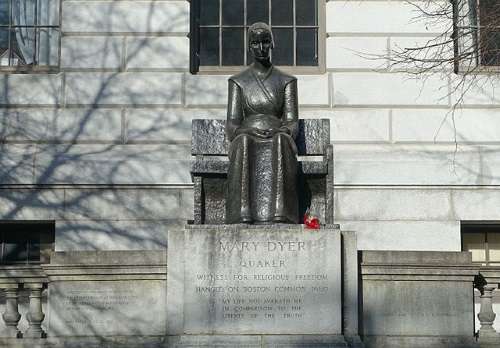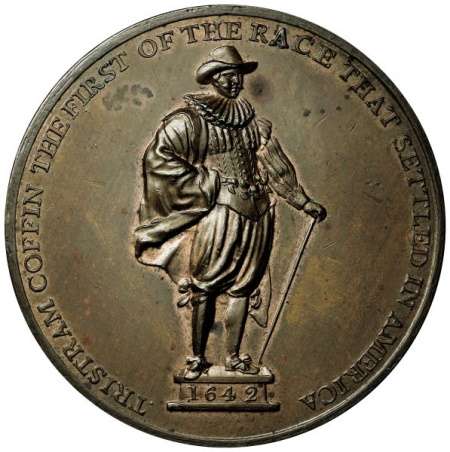In the summer of 1657, a rainstorm drove four men to the home of Thomas Macy in Amesbury, Mass. They sought shelter and directions to Hampton, N.H., and to Casco Bay. Macy was wary, but he let them stay a short time while the rain let up.
Macy was a founder of the town of Amesbury and its first town clerk, having moved from Salisbury. His position, however, did not place him above the law, and Macy was very much breaking the law by opening his home to the visitors.

Puritans landing in the New World.
Macy was a Baptist. That already placed him in a difficult position with the Puritan leaders of Massachusetts, who banned Baptists from preaching. But to make matters worse, the men now seeking shelter in his home were Quakers. One was Edward Wharton; some sources say the others included William Robinson and Marmaduke Stephenson.
Stephenson and Robinson, Quakers banished from Massachusetts, had chosen to return. They did it to protest a recent law that ordered the death penalty for banished Quakers without property who returned to Massachusetts. In October of that year, that’s exactly what happened to Robinson and Stephenson. Two others, known as the Boston Martyrs, suffered the same fate. A statue to one of them, Mary Dyer, now stands in front of the Massachusetts Statehouse.

Statue of Mary Dyer in front of the Massachusetts Statehouse.
Thomas Macy
For Thomas Macy, the consequences of his actions were less severe. A 1657 law made it a crime to entertain Quakers. Macy’s neighbors notified the Rev. Worcester of the infraction, and he placed the matter before the General Court.

Thomas Macy’s house, known as the Macy-Colby House, now on the National Register of Historic Places.
Macy pleaded innocent of holding Quaker leanings. “On a rainy morning there came to my house Edward Wharton and three men more; the said Wharton spoke to me, saying they were travelling eastward, and desired me to direct them in the way to Hampton, and asked me how far it was to Casco Bay.
“I never saw any of the men before except Wharton, neither did I inquire their names or what they were; but by their carriage I thought they might be Quakers and told them so, and desired them to pass on their way, saying to them I might possibly give offence in entertaining them; and as soon as the rain ceased (for it rained very hard) they went away, and I never saw them since.
45 Minutes
“The time they stayed in the house was about three quarters of an hour, but I can safely affirm it was not an hour. They spoke not many words in the time neither was I at leisure to talk with them, for I came home wet to the skin immediately before they came to the house, and I found my wife sick in bed. If this does not satisfy the Honored Court I am subject to their sentence.”
The explanation did not satisfy the honored court, which fined Macy 30 shillings and admonished him. The episode inspired John Greenleaf Whittier’s poem, The Exiles.
With the increasing intolerance of the Puritans, the finding could not have surprised Macy. He had apparently already been plotting an escape.

1827 medal depicting Tristram Coffin
He had joined with Tristram Coffin in planning a new settlement — out of the reach of the Puritan extremists. Coffin, also a Baptist, had left England at the start of the English Civil War in 1642. He had gathered a group of like-minded investors and had arranged to purchase the island of Nantucket from Macy’s cousin, Thomas Mayhew.
Nantucket
Mayhew had settled on Martha’s Vineyard where he served as governor. He acquired Nantucket via a grant and purchase from Native Americans, and he was ready to sell the whole of Nantucket less a portion he retained for himself.
With Nantucket falling under the jurisdiction of New York, the new residents hoped to make it a more tolerable place. For the sum of 30 pounds and two beaver hats, the investors bought Nantucket in July of 1659 and made it their new home. The island did become the tolerant locale that the founders envisioned, with Quakers making up a large portion of the population.
Macy remained a lifelong Baptist. The Macys established a family there, and he died at 74 in 1682 after a successful career. His wife Sarah lived on another 24 years, and she did in fact become a Quaker late in life.
This story was updated in 2023.
Images: Macy-Colby House By Daderot at the English-language Wikipedia, CC BY-SA 3.0, https://commons.wikimedia.org/w/index.php?curid=17590751.

9 comments
Maeve and Wyatt, this town was your first home, and I thought you might enjoy a little bit of history of the place!
Thank you for this information I wrote an article a few years back for Newbiuryport News on Thomas Macy– “Preacher spats with Puritans” Please see http://ancestoryarchives.blogspot.com/2014/03/thomas-macy.html
He wasn’t alone!
He wasn’t alone!
[…] for his “profane and wicked speeches tending toward blasphemy.” He was, his critics accused, no better than a Quaker – a charge which infuriated […]
[…] Quakers first arrived in the American colonies in 1656, in Massachusetts. They were quickly made unwelcome – imprisoned, fined and whipped and their books were destroyed. They tried to establish a […]
[…] Quakers first arrived in the American colonies in 1656, in Massachusetts. They were quickly made unwelcome – imprisoned, fined and whipped and their books were destroyed. They tried to establish a […]
[…] Quakers first arrived in the American colonies in 1656, in Massachusetts. They were quickly made unwelcome – imprisoned, fined and whipped and their books were destroyed. They tried to establish a […]
[…] Quakers first arrived in the American colonies in 1656, in Massachusetts. They were quickly made unwelcome – imprisoned, fined and whipped and their books were destroyed. They tried to establish a […]
Comments are closed.